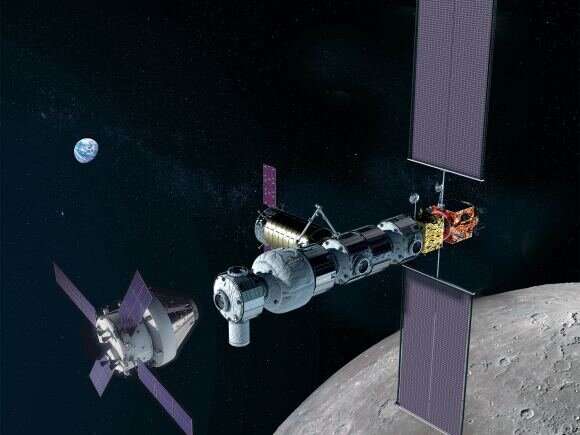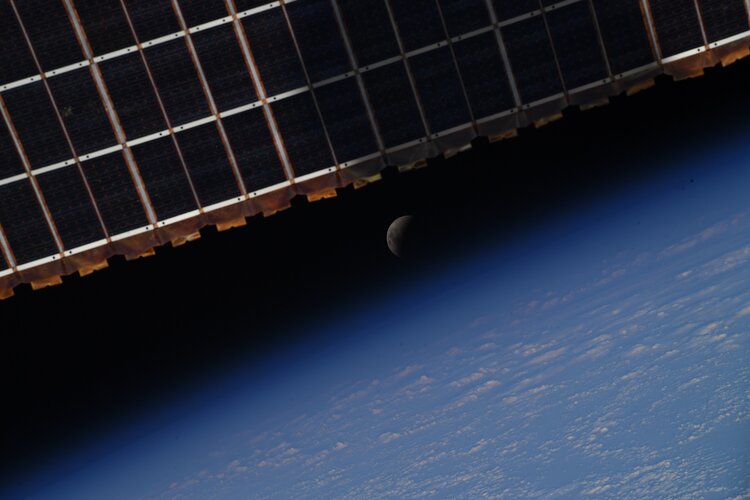
Copernical Team
A CubeSat is flying to the moon to make sure Lunar Gateway's orbit is stable

Before this decade is over, NASA will send astronauts to the moon for the first time since the Apollo Era. As part of the Artemis Program, NASA also plans to establish the infrastructure that will allow for a "sustained program of lunar exploration." A key part of this is the Lunar Gateway, an orbiting space station that will facilitate regular trips to and from the lunar surface. In addition to being a docking point for ships going to and from Earth, the station will also allow for long-duration missions to Mars.
The Gateway will have what is known in orbital mechanics as a "near rectilinear halo orbit" (NRHO), meaning it will orbit the moon from pole to pole. To test the long-term stability of this orbit, NASA will be sending the Cislunar Autonomous Positioning System Technology Operations and Navigation Experiment (CAPSTONE) to the moon by the end of May.
Peek-a-boo Moon
 Image:
Lunar eclipse captured by Samantha Cristoforetti aboard the International Space Station
Image:
Lunar eclipse captured by Samantha Cristoforetti aboard the International Space Station Humans have big plans for mining in space, but there are many things holding us back

Like Earth, planetary bodies such as the moon, Mars, asteroids and comets contain substantial deposits of valuable resources. This has caught the attention of both researchers and industry, with hopes of one day mining them to support a space economy.
But setting up any kind of off-Earth mining industry will be no small feat. Let's look at what we're up against.
In-situ resource utilization
When you think of off-Earth mining, you might imagine extracting materials from various bodies in space and bringing them back to Earth. But this is unlikely to be the first commercially viable example.
If we wanted to establish a permanent human presence on the moon, as NASA has proposed, we would need to resupply astronauts living there. Resources such as water can only be recycled to an extent.
At the same time, resources are extremely expensive to launch from Earth. As of 2018, it cost about A$3,645 to launch one kilogram of material into low Earth orbit, and more to launch it higher, or onto the moon.
Video: How Galileo works, for its 2 billion global users

Video: How Galileo works, for its 2 billion global users
ESA Open Day on Web TV

ESA Open Day on Web TV
Research Fellows in space science 2022
 Image:
Image:
ESA has selected 9 new Fellows to pursue their own independent research in 2022. The Research Fellowships in Space Science represent one of the highlights of the ESA Science programme. Early career postdoctoral scientists are offered the unique opportunity to carry out advanced research related to the space science areas covered by ESA Science missions at one of three ESA establishments (ESAC, ESTEC or STScI) for a period of up to three years.
The 2022 Research Fellows in Space Science are Guadalupe Cañas Herrera, Quentin Changeat, Chiara Circosta, Willi Exner, Nicola Pietro Gentile Fusillo, Adam Hepburn, Samuel Pearson, Alicia Rouco
Find your way to the future at ESA’s NAVISP Industry Days

After a pandemic-induced gap of more than two years, Europe’s leading companies working on positioning, navigation and timing technologies will meet face-to-face at ESA’s technical heart in the Netherlands for the NAVISP Industry Days, devoted to the latest developments in the Agency’s Navigation Innovation and Support Programme.
ESA spurs investment in space entrepreneurs

Dozens of people who have set up start-up companies and fledgling businesses are pitching their ideas to investors today, as part of an ESA Investor Forum held in Berlin.
Researchers reveal the origin story for carbon-12, a building block for life
 With the help of the world's most powerful supercomputer and new artificial intelligence techniques, an international team of researchers has theorized how the extreme conditions in stars produce carbon-12, which they describe as "a critical gateway to the birth of life."
The researchers' fundamental question: "How does the cosmos produce carbon-12?" said James Vary, a professor of physics
With the help of the world's most powerful supercomputer and new artificial intelligence techniques, an international team of researchers has theorized how the extreme conditions in stars produce carbon-12, which they describe as "a critical gateway to the birth of life."
The researchers' fundamental question: "How does the cosmos produce carbon-12?" said James Vary, a professor of physics Earth from Orbit: NOAA Debuts First Imagery from GOES-18
 On May 11, 2022, NOAA shared the first images of the Western Hemisphere from its GOES-18 satellite. The satellite's Advanced Baseline Imager (ABI) instrument recently captured stunning views of Earth.
GOES-18, NOAA's newest geostationary satellite, launched on March 1. The ABI views Earth with sixteen different channels, each measuring energy at different wavelengths along the electromagne
On May 11, 2022, NOAA shared the first images of the Western Hemisphere from its GOES-18 satellite. The satellite's Advanced Baseline Imager (ABI) instrument recently captured stunning views of Earth.
GOES-18, NOAA's newest geostationary satellite, launched on March 1. The ABI views Earth with sixteen different channels, each measuring energy at different wavelengths along the electromagne 